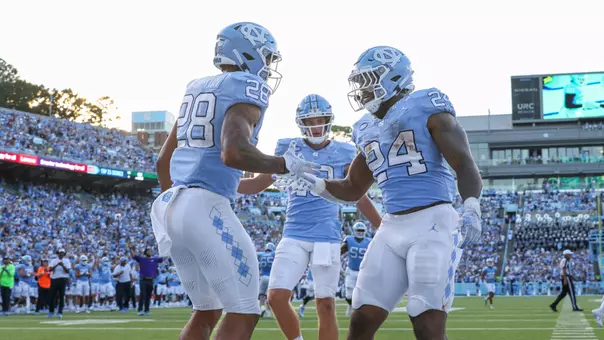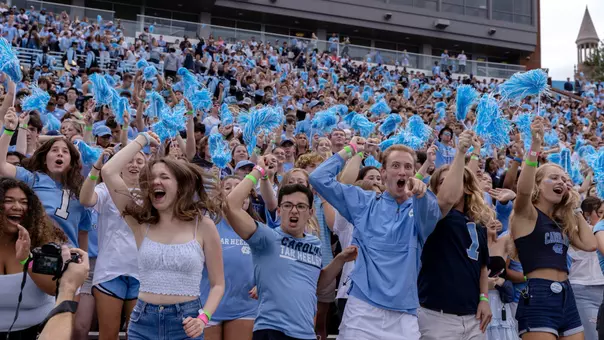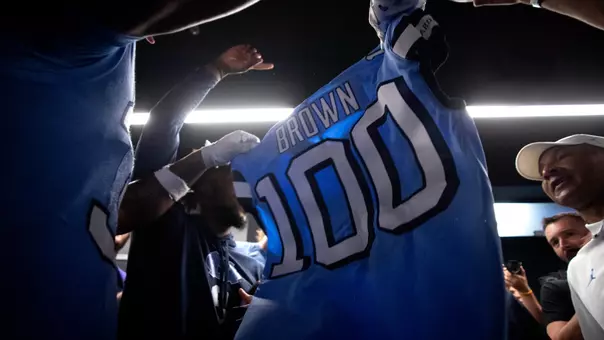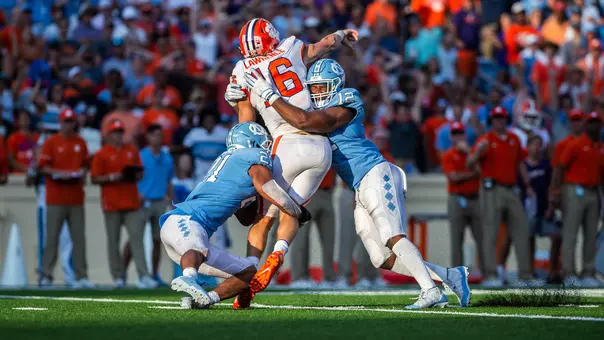University of North Carolina Athletics
EXTRA POINTS SPECIAL: John Bunting: A Coach Is Born
May 1, 2001 | Extra Points
April 30, 2001
Part I: Introduction (March 26, 2001)
Part II: The Early Days (April 2, 2001)
Part III: The Carolina Years (April 9, 2001)
Part IV: On the Wings Of An Eagle (April 16, 2001)
One day, John Bunting is a starting linebacker in the Super Bowl. His face is in People magazine. He's famous on the streets of Philadelphia. He's used to traveling first-class with his teammates. His name pops up on the graphics shown on CBS television, with Pat Summerall and Tom Brookshire saying what a force he is on the Eagles' defense.

|
And when he can squeeze in a moment here or there, a football coach as well. That's why he's here in August, 1988, the new head coach at Glassboro State College, a public institution of some 10,000 students located in the New Jersey countryside 20 miles southeast of Philadelphia.
The accouterments and trappings be damned. Football is football.
"The blood and the emotions inside the players, all of that is the same, no matter what level you're at," Bunting said at the time.
And even though you exchange pads and cleats for whistle and clipboard, your innards still fidget and thrash and stew. "I sometimes feel like my heart is going to explode on the sidelines," Bunting said.
From adolescence to college, from wide-eyed rookie to steely-eyed veteran, Bunting played football with heart.
Now it was time to turn that passion into another endeavor. It was time to coach.
John Bunting's week-to-week existence during the fall of 1986 went something like this:
Saturday -- Coach the defensive ends for Brown University in an Ivy League game, either at Brown's home of Providence, R.I., or other venues from Boston to New Haven.
Sunday -- Rise at 6:30 a.m. to grade film. Catch a 10 a.m. flight to Philadelphia for Eagles' NFL game. After the game, interview players and then go to studios of radio station KYW to write and record game analysis, sometimes not leaving until 2 or 3 a.m.
Monday -- Attend press luncheon of Eagle coach Buddy Ryan, then catch flight back to Providence for Bears' practice at 7 p.m.
Tuesdays & Wednesdays -- Work on Brown game-planning and film study with coaching staff, direct defensive ends during afternoon practice sessions.
Thursday -- Meet with Bears defensive ends over breakfast, then fly back to Philadelphia to attend Eagles' afternoon practice.
Friday -- Write analysis previewing Eagles' Sunday game and record it for the pre-game show. Catch 3:15 p.m. flight back to Providence for 7:30 team meeting.
This for three months running. If the Eagles were on the road, multiply the logistical hassles. Bunting outlined the killer schedule before the season to his good friend and former boss, Dick Vermeil. The ex-Eagles coach told him to "go for it and sleep later."
Bunting shakes his head remembering those days.
"It was hard on me, hard on my family," he remembers. "I didn't see my kids much. What it did was tax me to the point that I said, `Something has to give.' I was not enjoying coaching football, not because of the kids, but because of the staff. It was not a cohesive staff at the time."
There were parts of coaching that Bunting loved. During his summers while attending Carolina from 1968-72, he'd return home to Silver Spring, Md., and coach a youth baseball team. The coaching bug bit, albeit just a little morsel. "I loved the strategy," he says. "I loved the pressure of making the guys perform, of helping guys get better. I loved the camaraderie."
An admitted "film wonk," Bunting served as a coach-on-the-field during his 11-year tenure with the Eagles and his two seasons with the Philadelphia Stars of the USFL. He was the Stars' linebackers coach in 1985. But the USFL folded after the 1985 season, leaving Bunting to look for work while trying to remain close to Philadelphia and his teen-age children.
This 1986 juggling act gave Bunting another chance to view the coaching business as well as learn the sports-media profession from the inside. He didn't like the politics on the Brown staff. The nomadic existence of a coach and the lack of security were not appealing.
"I made the decision, `I'm done--no more coaching,'" he says. "TV and radio was what I wanted to do. I'd enjoyed doing radio up to that point, and I thought I could make a career in TV."
Then came one of those curious little events that send lives down the left fork in the road instead of the right or the middle. Some people believe there are no coincidences.
In August of 1987, Bunting's son Brooks was attending a golf camp in south New Jersey, and one of the instructors was Ted Kershner, who during the fall was the head football coach at Glassboro State. Brooks and Kershner were talking one day and Brooks mentioned that his dad was the ex-Eagle linebacker and was flirting with the coaching business. Kershner said he was looking for a defensive line coach.
"Dad, you mind if I give coach Kershner our number?" Brooks asked.
Bunting said he didn't mind, but didn't think anything of it.

relishes a big victory during successful run at Rowan University from 1988-92. |
Kershner called. They talked. They struck a deal--Bunting would coach the Professors' defensive line that fall and still do radio work, this season as color analyst on the Temple University Owls network.
Now the dominoes start falling:
Kershner retires after one year and Bunting is named head coach.
Bunting falls back in love with coaching because he's working with good assistants and good kids in a pleasant Division III environment.
He falls in love with the women's basketball coach.
He builds a championship contender.
He gets married.
He gets an opportunity to coach in the NFL after five seasons.
He helps coach a team to a Super Bowl title.
Carl Torbush loses one or two games too many.
Frank Beamer has a change of mind.
And now Bunting's where he wants to be--coaching at Carolina.
"I'm in coaching today because my son talked to Ted Kershner," Bunting says. "That's the path my life took that afternoon."
Glassboro Normal School was founded in 1923 as a teachers' training school and grew over the years into a state-supported college. The institution was renamed Rowan College in 1992 when benefactors Henry and Betty Rowan donated $100 million, and in 1997 it achieved university status. It began playing football in 1947, took a 12-year hiatus from 1951-63, and, as the 1980s developed, settled into middle-of-the-road stature in the New Jersey Athletic Conference, occasionally winning a league title (1983) but usually finishing around 5-5. The school gave no scholarships, and its head coach, Ted Kershner, was also a teacher. He had no paid assistant coaches.
An attractive element to Glassboro in John Bunting's decision to coach there in 1987 was the fact that one member of its coaching staff was a former teammate with the Eagles, K.C. Keeler. The former Delaware standout had played defensive back for the Eagles in the early 1980s and now was the Professors' linebackers coach. When Kershner decided to become the athletics director in 1988, the school felt Keeler, still in his 20s, wasn't quite experienced enough, so it named Bunting head coach. It also tweaked its commitment to football by making Bunting the school's first full-time coach, one with no teaching responsibilities.
"Glassboro got lucky and I got lucky," says Keeler, who became Bunting's chief assistant. "I knew John was a great player and a great leader. I'd been with the Eagles during the strike season in 1982. John was the players' rep, and the team had guys who'd follow him blindly. But you didn't know exactly what kind of coach he'd be.
"What they got was a guy who had such great passion for the kids. He was a guy who could motivate. And he turned out to be a great football coach. I moved over to offense. It was a great growing experience for me. My wife and I still joke about that first year. At home on the weekend, the phone rang 30 times a day. It was John with another idea."
Keeler is showing a visitor around the football building on the Rowan campus. It's a square, one-story building that sits beside the playing field, which is bounded by the same wooden bleachers you can find at thousands of high schools. He opens the door to an office, no more than 15 feet square, that is shared now by two assistants but a decade ago by Bunting and himself.
"I can still see John sitting in that chair with a recruit," says Keeler. "It was my job to find them and get them here. I'd show them around and then bring them in to see John. Boy, when he got you in this room, he'd finish you off. Bam, he'd nail 'em. I'd sit here thinking, `Man, this is good stuff.' He was a great recruiter. He's a fiery guy. He leads with his heart. Kids picked up on that and wanted to come play for him."
Bunting's recruiting paid off as he lured enough players to Glassboro to improve over five years from 5-5 to 5-3-2, from 7-3 to 9-2, and, finally, to 12-1 in 1992. Bunting's last game with the Profs was an 18-13 loss to Washington & Jefferson, a win would have put them in the Amos Alonzo Stagg Bowl for the Division III national championship.
"Since then we've been to the Stagg Bowl four times," says Keeler, Bunting's replacement as head coach. "We've maintained what John started here and tried to build on it."
The Professors' program is at the other end of the big-time spectrum. There's no scholarship money, and recruiting can't really get going until the national signing day in February, when the big schools pick the cherries. There's little support staff to speak of, leaving the head coach to wear every hat in the book. Sometimes facilities got cramped in Bunting's day and either the offensive or defensive staff would watch film in the shower room.
But it's still football, and blocking and tackling and Xs-and-Os are the same. Bunting and staff rarely left before 2 a.m. during game weeks. The assistants would do their day jobs--some are teachers in nearby high schools, one runs a glass-repair business--then convene for practice, meetings and film study. "I'm not sure if my eyes have ever recovered from the John Bunting era," Keeler says with a laugh.
And people are people, whether they're in the Super Bowl or playing for a middle rung in the New Jersey Athletic Conference.
"Anyone who played for John, loved him," says Richard Wackar, the former school football coach and the athletic director when Bunting was hired in 1987. "He could get more out of the kids than they believed they had in them."
"He's a wonderful man in dealing with college-age kids," says Joy Reighn, Rowan's athletics director today. "He cares about the kids. He disciplines them, wants them to respect people. He really knows how to handle them."
Adds Joe Low, a linebacker during the Bunting days: "His word was gold. It was the essence of a team playing for a coach."

to coaching and introduced him to Dawn, the school's softball and women's basketball coach. |
Dawn liked that "JB," as friends have known him, was an average Joe, a hard worker and competitor and someone who could relate to kids. Their friendship blossomed into romance, and they were married on May 25th, 1991, on the shore at Topsail Beach. They set off on dual winning paths--John on the football field, Dawn on the basketball court (her teams won more than 60 percent of their games)--and since have been each other's biggest fan.
"There's nothing false or fake about him," she says. "He ego was always under control. So what if he was a former NFL star? He's never been boastful."
"I admired her as a person from a distance before we were married, and I think she's an outstanding coach and person," Bunting says. "I have the highest degree of respect for her integrity and dignity."
Anyone with late-1980s to early-1990s connections to Rowan University has a favorite John Bunting story.
There was the time Bunting had trouble getting a transcript from North Dakota State University for a prospective player. So he decided to call the registrar's office and pretend to be the player in question. It was not good when the woman in North Dakota realized that the man on the phone, of mid-Atlantic, Caucasian descent, could not possibly be who he said he was, who she knew personally to be of African-American lineage. Bunting immediately came clean and apologized. But he got his transcript.
There was the time Bunting raised enough money through the school's booster club to finance an overnight trip before a game in New York state. The Friday night before, the history major from the University of North Carolina read from one of his favorite novels, The Killer Angels, about the pivotal Civil War battle at Gettysburg.
"It's 7:30 the night before the game and he's snarling and all pumped up reading this stuff," says Peter Goetz, a linebacker from 1989-92. "He looks like Johnny Reb running down the hill with his bayonet, yelling and screaming. That's how intense he is."
The Profs had a game with perennial power Ramapo on the horizon in two weeks in October, 1991, and Bunting committed the cardinal sin of looking past the immediate opponent. But he did so on purpose. Burl Battle was an exceptionally fast wide receiver, and Bunting inserted him at quarterback during practice to run a package of option plays. The Profs ran some of that option in their win that weekend, Bunting knowing that the Ramapo staff, having studied the Rowan film, would expect the option the next week if and when Battle lined up at quarterback.
So Bunting builds a fumble-rooski off the option series.
Ramapo held a 14-10 lead in the fourth quarter when, on third-and-11, Bunting sent Battle into the game. The quarterback seemingly takes the snap on an option to the right, then center Danny Ryan lays the ball on the ground and covers it for a count of two. John Rechner, a linebacker coverted to guard and inserted specfically for this play, then picks the ball up and, with the Ramapo defense flying toward the option, rolls away from the action to a touchdown.
"It worked like a charm," says Goetz.
"Everybody just stood there in amazement," says Rechner. "They didn't even chase me."
Rowan won the game, 17-14.
One week the opponent on Saturday was the College of New Jersey, which had a lion as a mascot. Bunting was trying to think of a trick to liven up practice. He found an old stuffed lion, hid it during the first part of calisthenics, then brought it out. He poured lighter fluid on it and put a match to it. "That's what we're gonna do to the Lions," Bunting cried, his voice and black smoke billowing across the field.
Once after a lackluster win in Newark, Bunting had the team run wind sprints before boarding the bus to go home. One of the opposing assistants asked Glassboro assistant coach Frank Law, "What hell do you do when you lose?"
And there was the time on a nasty, rainy day in November when Bunting sensed an "I-don't-wanna-be-out-here" attitude among his players. He ran toward a huge puddle in the practice field, dove into it, emerged from the muck muddy and wet from head to toe and announced, "This is what Trenton State will look like when we're done with them."
Occasionally the players would see Bunting talking to an old man in ragged clothes reeking of cheap wine who'd wander by the practice field and lean against the team building. A few days later the same man might be having dinner in the school cafeteria, with Bunting instructing his players to say hello and pat the fellow on the back after finishing their dinners.
No one knew anything about the man except that his name was "Joe."
"Coach Bunting said, `He doesn't have anything. We can take a minute to be nice to him,'" says Goetz. "He'd even gave Joe a ticket to the game. The amazing thing was that Joe would show up.'"

Bunting reflecting on the impact that Danny Ryan (L) had on his Professors' football program. |
"Danny was one of John's favorites," says Mike Nardello, a former Prof and a man who worked with Bunting and Wackar to revive the Brown & Gold Gridiron Club, the school's booster organization. "Danny was tough and was a hard worker, like John in his playing days."
"Danny was a classic over-achiever," adds Steve Tucker, an assistant coach then as now. "He was very intelligent. At times he was physically over-matched, but he never quit fighting. He was one of those who got the most from the least. John loved that about him."
After graduating, Ryan became a member of the Brown & Gold Club and then went on the road as manager for the mentalist act, "The Amazing Kreskin." Around Christmas in 1995, Ryan lost his life after a 30-month battle with leukemia. Bunting was coaching at Kansas City, and the Chiefs beat Seattle to earn a bye week into the playoffs. Chiefs coach Marty Schottenheimer allowed Bunting some time to visit the Ryan home in Monroe Township. He and Dawn flew back east to attend the viewing at the funeral home the night before memorial services. Everyone wondered if Bunting would be able to get there.
"The room is full of ex-players, guys from the Gridiron Club, townspeople, family members," says Nardello. "John and Dawn are the last ones there. He goes to every flower, every photograph, pauses and looks at them. The entire room just stops. He speaks to the parents. It was a very touching moment."
Nearly 10 years after leaving, Bunting still maintains close ties with Rowan University and the town of Glassboro. A half-dozen Professors coaches visited him during spring practice in Chapel Hill. He stays in contact with many of his players as they mature from kids playing football to grown men earning livings and raising families.
"He's one in a million," says Low. "I took values from that program and apply them to life today, particularly the extra work and the attention to detail."
"There's an aura about him," says Kenny Ryan, Danny's brother and a deep snapper/safety from 1990-94. "He walks into a room, everyone wants to hear what he has to say."
"I've probably got 18 phone numbers for Coach," says Goetz. "No matter where he's coaching, that team becomes my favorite team."
And all of this because Brooks Bunting took golf from Ted Kershner back in the summer of 1987.
"That little detour has taken John some amazing places," says K.C. Keeler. "Wow."
As John Bunting sits in his opulent office overlooking the playing field at Kenan Stadium, he'll never be far from the memories of his six years at Rowan University. He sits in a fine leather chair and is surrounded by rich cherry paneling--components of a $50 million stadium overhaul completed in 1997--when just a decade ago he was watching film in the shower room. It gives a man perspective, a sense of respect for others who mow the grass and hose down the seats.
"You coach at the Division III level and come here, it impacts the way you look at your building," Bunting says. "It affects the way I feel about the people who look after the building. It affects how I expect our players to take care of it."
With two weeks left in spring practice in April, Bunting made the Players' Lounge on the second floor of the Kenan Football Center off-limits until further notice. Some players were late for meetings because they were distracted playing pool, and the room was littered one day with paper cups.
"To heck with it," Bunting says. "If they're going to abuse the privilege, I'll take it away."
His eyes can still mist a little when you ask about Danny Ryan, whose picture he displays on a bookshelf. Mike Nardello will weep today reliving the emotion that flooded over that funeral home full of mourners when the Buntings arrived from Kansas City.
"Danny was the kind of kid John believed in," Nardello says. "John never forgot where he came from. He never forgets ..."
His voice trails off.
Bunting is asked if he'd like to find a little of Danny Ryan in every player who wears a Tar Heel jersey today, in every high school prospect he considers for admission to the club in the future.
"Yep. Yep. No question," he says, his eyes seemingly fixed a million miles away. "I want someone who has leadership skills, someone who cares about the program, someone who cares about people. It's deeper than just football."
Bunting checks back into the moment.
"These kids here now are starting to understand that," he continues. "They don't completely yet, but they will. That's why I'm doing this. Otherwise, I'd just go coach ball. Coach in the pros. But I missed having that impact up there. I missed those relationships. I think I can influence kids in a positive way."
Lee Pace, editor and publisher for 11 years of Extra Points, a newsletter devoted to the careful study of Tar Heel football, has interviewed dozens of family members, former teammates, players and coaches who have touched and been touched by Bunting for this exclusive series of articles. From his youth in Silver Spring, Md., to his days as a Tar Heel from 1968-71, from his days as a Philadelphia Eagle to his start in the coaching business at Rowan University, you'll relive the influences and special moments that have shaped Bunting's life over the next several installments of "The Bunting Era Dawns For Carolina."
NEXT WEEK -- Part VI, A Second Tour of the NFL.
Part I: Introduction (March 26, 2001)
Part II: The Early Days (April 2, 2001)
Part III: The Carolina Years (April 9, 2001)
Part IV: On the Wings Of An Eagle (April 16, 2001)
Thanks to the following businesses and individuals who have helped fund this series on John Bunting:
UNC Dept. of Athletics
The Educational Foundation Inc.
Gayle Bomar, IJL Wachovia
John Anderson, General Shale Brick
Paul Miller, Quixtar
John Cowell, The Home Team




